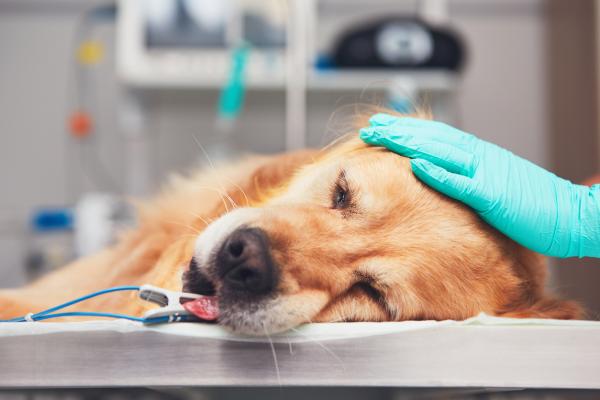
If your dog has suddenly lost their ability to open their mouth, they most like have masticatory muscle myositis. This immune system disorder disables your dog from eating, chewing and even picking up their toys. It is extremely painful for our dog.
This is why in this AnimalWised article we are going to go through what masticatory muscle myositis is, its symptoms, causes and most importantly, how to treat it.
What is masticory muscle myositis in dogs?
Masticatory muscle myositis (MMM) is an immune system disorder where the dog's immune system identifies the dog's own muscle tissue as foreign and attacks it. The masticatory muscles are the muscles used for chewing, this means that the dog cannot open their mouths are are in extreme pain.
Early in the course of this disorder, the masticatory muscles are swollen and warm. To be able to recognize this disorder in your dog, you may observe:
- Jaw pain
- Inability to open their jaw
- Swelling of the jaw muscles
- Difficulty eating and drinking
- Jaw is warm to the touch
- Eyes are sunken into their sockets
Their muscles then begin to waste away. Their future of the dog will depend on the degree of the inflammation and the dog's therapy. It's crucial to get MMM diagnosed early on so your dog can begin their treatment as soon as possible. When this is the case, the dogs are usually able to regain their normal jaw functions without pain. Unfortunately in other cases scar tissues can form within the muscles and cause permanent issues.
This is why it's highly important to take your dog to the veterinarian as soon as you see the common symptoms arising. Then, your dog will have a higher chance for a better future.
Myositis is nothing more than inflammation of one or more muscles . It has different causes in dogs and is usually classified according to the affected muscle. It is one of the pathologies that most affects the well-being of the patient, since it not only limits it when it comes to making any movement, but it is a disease that usually generates a lot of pain .
It has been reported that it affects mostly large and giant breed dogs and that age can also be a trigger (affecting older dogs more), however, any breed can be affected and young dogs are not entirely safe. It is a disease that ends up presenting itself for various causes and that has different ways of manifesting itself, therefore, the attention that the tutor must pay to his best friend must always be constant, since an early detection will help the veterinary doctor to restore the quality of life to the patient as quickly as possible.
Types of myositis in dogs
Myositis literally means muscle (myo-) inflammation (-sitis). This disorder is part of the group myopathy that represents different muscle diseases which all share the feature of inflammatory cells within the muscle. Myositis can affect dogs in just one muscle or in groups of muscles:
- Masticatory Muscle Myositis: chewing muscles found on the top and the side of the head.
- Extra-ocular Muscle Myositis: muscles that move the eyeball.
- Polymyositis: all muscles in the body.
- Dermatomyositis: skin lesions develop along with muscle atrophy. considered a hereditary disease.
Causes of myositis in dogs
Some of the suspected causes of canine myositis are:
- Trauma
- Hypothermia
- Age
- Parasites
- Viral infections
- Exposure to allergens
- Reactions to medication
- Exposure to environmental toxins
Myositis in dogs may also bee associated with cancer. The inflammation can develop first and then turn into cancer with time, or cancer within the body can trigger an immune reaction to the muscle. Nevertheless, each dog is a different case and so it's important to take them to the veterinarian as soon as possible.

What breeds are more susceptible
Although myositis can occur in any breed or gender, there are several breeds that have been identified as more likely to develop masticatory muscle myositis, these include:
- Golden Retrievers
- German Shepards
- Labrador Retreivers
- Doberman Pinschers
- Cavalier King Charles Spaniels
- and other large dog breeds
It can also be useful to note that the average age of MMM is 3 years of age. However, dogs as young as 4 months have also been reported in the veterinary literature.
Symptoms of myositis in dogs
As we've previously mentioned, there are certain signs and symptoms that can help us identify if our dog is suffering from MMM. Although each case is different and the degree of the disorder may vary, dogs with myositis will tend to have more or less the same symptoms. Here we have divided them into the different muscle groups affected:
Masticatory myositis:
- Inability to open the jaw
- Pain and inflammation in jaw
- Difficulty eating and drinking
- Loss of appetite
- Sunken eyes
- Muscle loss
Extra-ocular myositis:
- Blindness
- Swelling around eye
- Impaired vision
Polymyositis:
- Difficulty walking
- Muscle pain and weakness
- Loss of muscle
- Weight loss
- Severe pain
- Stiff walking
- Difficulty swallowing
Dermatomyositis:
- Skin lesions
- Muscle atrophy
- Muscle pain
Pet companions that recognize these signs should take their dogs to the veterinarian as soon as possible. The sooner the dog is properly diagnosed and begins their treatment, the greater their chance in recovery.

Treatment for myositis in dogs
Once taken to the veterinarian and a positive diagnosis is reached, your dog will begin their recovery. The current treatment for MMM involves an immune-suppressive dose of corticosteroid medication (usually prednisone) given over a period of months. They begin with an early aggressive treatment and then reduce because this technique offers the highest chance for remission from MMM. Some dogs may also require prednisone therapy for the rest of their lives, however, many are weaned off. These medications do include side effects, such as excessive appetite, excessive thirst and increased urination.
This article is purely informative. AnimalWised does not have the authority to prescribe any veterinary treatment or create a diagnosis. We invite you to take your pet to the veterinarian if they are suffering from any condition or pain.
If you want to read similar articles to My Dog's Jaw Hurts, we recommend you visit our Degenerative diseases category.
- Ettinger, SJ (1985). Textbook of Veterinary Internal Medicine, Diseases of the Dog and Cat. Second Edition. WB Saunders Company. Volume I and II Philadelphia Pa 18105.